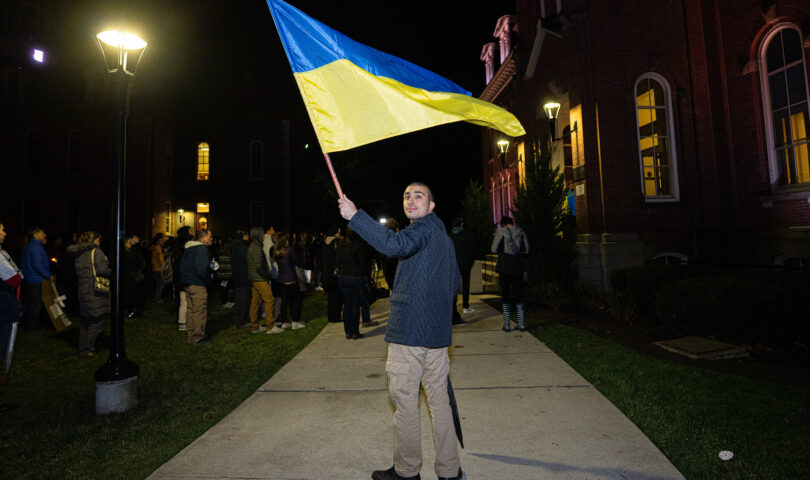Erik Herron made for an apt metaphor on a blustery Monday evening as he gathered with others at Woodburn Circle.
Herron, a WVU political science professor who was a Fulbright scholar in Ukraine 20 years ago, was wielding one of those wand lighters on occasion of what was supposed to be a candlelight vigil for that country’s suffering.
“I’m just gonna try to pass the flame, OK?” he said, as he set about trying to get those candles ablaze for the evening.
Around 100 people came out for ceremony organized by Morgantown’s Ukrainian community.
The audience applauded, shouted “Slava Ukraini” – Glory to Ukraine – and weren’t bothered one bit that they couldn’t get those candles to burn due to the stout breezes, which wouldn’t cooperate.
That’s because, as the professor said, the people of Ukraine won’t burn either.
That’s because, he said, the flame was already passed – just for showing up in front of the stately building on the downtown campus.
“The proof is all around you,” he said, standing in front of a microphone at a podium draped with the country’s flag.
“We’re gathered to hear stories and to sing and to pray. As the lyrics to the national anthem tell us, Ukraine has not yet perished.”
The gathering in Morgantown commenced at exactly 7 p.m., which meant it was already 2 a.m. Tuesday, in Kharkiv.
Which also meant Sergiy Yakovenko’s parents endured yet another round of shelling and scurrying trips down to the cellar as the air sirens sounded.
“They’re pretty hearty people,” said their son, who is a WVU professor of neuroscience.
Yakovenko came to the U.S. a decade ago from the country’s second-largest city and the site of intense fighting over the past 12 days, after Russian soldiers amassed at the border.
If luck in a war zone is relative, his parents are, well, relatively lucky, the 45-year-old researcher said.
He grew up speaking Russian in the city, living in, as he put it, “One of those typical Soviet-style apartment buildings.”
In later years, though, his mother and father, who are 75 and 77 respectively, moved out of the city, to a small farm, where they raise tomatoes and some livestock.
“They’ve escaped the brunt of the shelling so far, but my brother did dodge a bomb on his way to work this morning. Try that, for some perspective.”
Same as it ever was?
Try 1.7 million people, for another. That’s how many Ukrainians are now refugees and that’s how many people live in West Virginia currently.
The community earlier in the day staffed informational tables in the Mountainlair, as it did last week, with flyers, QR codes and other avenues for people to contribute. The community’s website, www.Morgantown-ua.info, is still very much an online presence.
Meanwhile, Khrystyna Pelchar is still a presence in her classroom, even though the 24-year-old doctoral student in political science admitted she’s tired and fearful, as she worries for her mother, sister and grandmother back home in Lviv, the largest city in western Ukraine.
The Russian military has yet to hit the streets of her hometown, she said. Still, her family back home is soldiering on with the homefront effort. The least she can do is the same, said Pelchar who has been a chief organizer of events here for the Morgantown Ukrainian community.
“I’m keeping up in my classes,” she said, “although my thoughts are elsewhere. My family would be disappointed if I didn’t.”
Meanwhile, the professor and the doctoral student weren’t the only ones in attendance Monday who are actually from Ukraine – or have Ukrainian ties.
Wes Bergen, who pastors at Morgantown’s Church of the Brethren is Ukrainian, in fact, by way of his grandparents. They fled their home country for the U.S. when Joseph Stalin launched the Russian Revolution 100 years ago.
Which is precisely why, the clergyman said, present-day Ukrainians back home will endure and prevail.
“They’re quite used to crazy Russian dictators.”
TWEET@DominionPostWV




